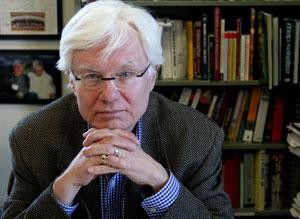Albert Bergesen is a sociology professor and head of the sociology department. He has been with the UA for 30 years and recently published “”The Sayyid Qutb Reader,”” compiled from the writings of Sayyid Qutb, an Islamic fundamentalist.
Here is part of a conversation the Wildcat had with Bergesen to discuss his teaching and his book.
W: What classes do you teach here?
B: I teach a variety of courses. Some graduate courses – like this semester, I’m teaching a course on sociology of culture. I teach an undergraduate course, (about) god in the movies … I also teach a sociology of terrorism course.
W: Is that a graduate level course?
B: No, that’s undergraduate. I haven’t taught it this year, but I taught it the year before.
W: When did you first start teaching it?
B: Just a couple of years ago. Once 9/11 hit, eventually I said, “”You know, you oughta have courses on this.””
W: So you just made a course because of 9/11?
B: I started doing terrorism research. I had done research before on hate riots, political witch hunts, other forms of violence and then after 9/11 I decided to try and understand terrorism. So I began studying it and that led me to Sayyid Qutb and his writings on Islamic fundamentalism.
W: And that’s what your book, “”The Sayyid Qutb Reader,”” is about, right?
B: That’s what my book is about, because when I gave the course, a) there were no collections of his writings and b) there were no books of his from non-Islamic, non-religious presses available.
W: Why do you think nobody thought to compile his books before?
B: You know, that is a great question. I don’t know; everybody talks about him when they talk about Islamic fundamentalism or terrorism.
W: Maybe you could tell the readers who Qutb is, because I don’t really know who he is.
B: It’s pronounced Qutb (hoe-tub), with a very guttural sound at the beginning. He was an Egyptian … In 1952 Colonel Abdul Nasser had a coup to take over the Egyptian government and kick out King Faruq. He and the Muslim Brothers, an Islamic organization in Egypt founded in 1928, are very close because they both want a kind of nationalism for Egypt. But they soon fell apart and there was supposedly an attempt on Nasser’s life. He was very angry at the Muslim Brotherhood (they are still outlawed today), so he arrested a bunch of them, including Sayyid Qutb. He went to prison, where he was tortured …
(His prison writings) include a 30-volume commentary on the Quran called, “”In the Shade of the Quran,”” which is a great way of putting it because of the desert and the coolness of shade. He was let out in 1965, got rearrested, charged with pamphleteering, was hung with three others in 1966 and became sort of a martyr for the Islamic fundamentalists.
Someone recently did a study at the West Point terrorism center on jihad Web sites, and he was the most quoted contemporary of Islamist theorist. So he is a prominent person. I decided this had to be done. Some people ask me why I’m doing this, and I’m of the school of thought that knowledge will set you free and if you want to understand these people, you have to start reading.
W: What are some of Qutb’s ideals?
B: Well, what Qutb helped do is to say that deferring to someone politically is allowing them to be your sovereign. But it’s also like worship because you defer to someone, and so what he was able to do was to say that in deferring to the government, people are, in affect, watering down God’s sovereignty by sharing it with others and thereby engaging in heresy, and requiring others to have a religious duty to act against or indict people for it. Thereby people can get a religious motivation for political activity and rising up, so then terrorist groups or any kind of social movements could use that as a way of justification …
He also added a kind of personal responsibility component; he said that it’s everyone’s responsibility to do something to help bring the world in line with God’s plans, thereby you have a duty to do something. When people get caught up in this, it’s not so much that the jihad finds them, it’s that they seek them out … They’ve had this quiet, inner awakening that it’s their responsibility.









